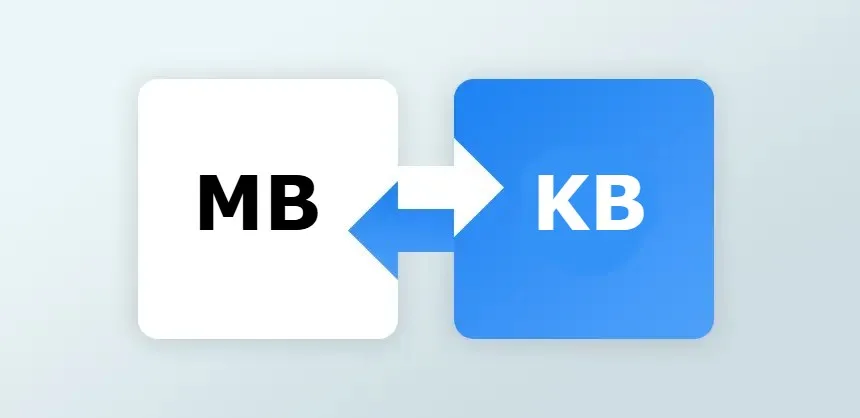MB to KB Converter - Convert Megabytes to Kilobytes & Other Units
Convert between megabytes, kilobytes, and other digital storage units. Understand data sizes, storage capacity, and performance implications.
Enter the number of megabytes to convert
Conversion Results
Enter megabytes value and select conversion type to see results
Related & Other Popular Converters
Quickly convert from Megabytes to Kilobytes with this free and easy to use MB to KB converter. Developers, students, and tech enthusiasts can quickly convert file sizes and data size for storage, file transfers, and computing.

What is Megabyte to Kilobyte Conversion?
A Megabyte (MB) and Kilobyte (KB) are standard digital storage units used for file sizes and data size/capacity. In computing, 1 Megabyte = 1,024 Kilobytes (Binary), while in networking/marketing, 1MB = 1,000 Kilobytes (Decimal).
This discrepancy occurs because computers operate by their data system (base 2) and uses powers of 2 to calculate data, while the marketing does so in 10 for ease of numbers.
Converting Megabyte to Kilobyte is very useful in determining file sizes, storage capacity, and requirements for a computer system - particularly when compelling the sizes of storage devices, or compressing data.
How to use the MB to KB Converter
The MB to KB converter provides accurate results for converting digital storage, whether converting site images, counting storage space, or analyzing app sizes.
Example Conversions
| Megabytes (MB) | Kilobytes (KB) - Binary | Kilobytes (KB) - Decimal |
|---|---|---|
| 1 MB | 1,024 KB | 1,000 KB |
| 5 MB | 5,120 KB | 5,000 KB |
| 10 MB | 10,240 KB | 10,000 KB |
| 100 MB | 102,400 KB | 100,000 KB |
These examples show how MB convert in KB can differ slightly based on the standard you choose.
Why use the Megabyte to Kilobyte Converter?
With our MB to KB converter, you can easily understand how data storage scales - from 1 MB KB conversions to gigabyte-level calculations.
Conversion Formula
Binary System (Computing)
1 Megabyte (MB) = 1,024 Kilobytes (KB)
Decimal System (Storage Marketing)
1 Megabyte (MB) = 1,000 Kilobytes (KB)
To calculate manually:
Kilobytes = Megabytes x 1,024 (for binary)
or
Kilobytes = Megabytes x 1,000 (for decimal)
Example:
If you want to convert 5 MB to KB (binary):
5 x 1,024 = 5,120 KB
Applications of MB to KB Conversion
Understanding Megabyte to Kilobyte allows you to effectively manage your storage capacity and performance across devices.
The relationship between Megabytes to Kilobytes is an important concept to understand when measuring data in the digital realm. If you are accessing storage, transferring a file, or writing code, understanding how MB convert in KB ensures your calculations are accurate, and that you are managing data efficiently.
Use the SantPro Tools MB to KB Converter today - your accurate, free, and fast solution for converting Megabytes to Kilobytes with ease.
FAQs
In the binary system, there are 1,024 KB in 1 MB, while in the decimal system, there are 1,000 KB in 1 MB.
The simplest way is to multiply the MB value by 1,024 (binary) or by 1,000 (decimal) or simply use our MB to KB converter to get the answer instantly.
Both are acceptable, just in different contexts. In computing, 1 MB equals 1,024 KB whereas in marketing, 1 MB is often deemed to equal 1,000 KB.
A computer operates in a binary manner (base 2). Therefore, because data is represented in powers of two, it is more purposeful to use 1,024 KB (2¹⁰) instead of 1,000 KB which is what is typically used in the marketing world.
Simply multiply the number of Megabytes by either 1,024 (for binary )or 1,000 (for decimal). Example: 2 MB would be equal to 2 x 1,024 = 2,048 KB.